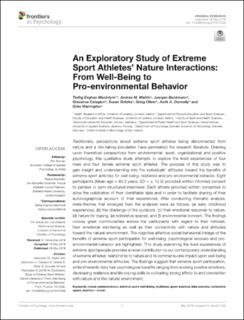| dc.description.abstract | Traditionally, perceptions about extreme sport athletes being disconnected from nature and a risk-taking population have permeated the research literature. Drawing upon theoretical perspectives from environmental, sport, organizational and positive psychology, this qualitative study attempts to explore the lived experiences of four male and four female extreme sport athletes. The purpose of this study was to gain insight and understanding into the individuals’ attitudes towards the benefits of extreme sport activities for well-being, resilience and pro-environmental behavior. Eight participants (Mean age = 40.5 years; SD = ±12.9) provided written informed consent to partake in semi-structured interviews. Each athlete provided written consented to allow the publication of their identifiable data and in order to facilitate sharing of their autobiographical account of their experiences. After conducting thematic analysis, meta-themes that emerged from the analyses were as follows: a) early childhood experiences, b) the challenge of the outdoors, c) their emotional response to nature, d) nature for coping, e) restorative spaces and f) environmental concern. The findings convey great commonalities across the participants with regard to their mindset, their emotional well-being as well as their connectivity with nature and attitudes towards the natural environment. The cognitive-affective-social-behavioral linkage of the benefits of extreme sport participation for well-being, psychological recovery and pro-environmental behavior are highlighted. This study examining the lived experiences of extreme sportspeople provides a novel contribution to our contemporary understanding of extreme athletes’ relationship to nature and its commensurate impact upon well-being and pro-environmental attitudes. The findings suggest that extreme sport participation, while inherently risky has psychological benefits ranging from evoking positive emotions, developing resilience and life coping skills to cultivating strong affinity to and connection with nature and the natural environment. | |
